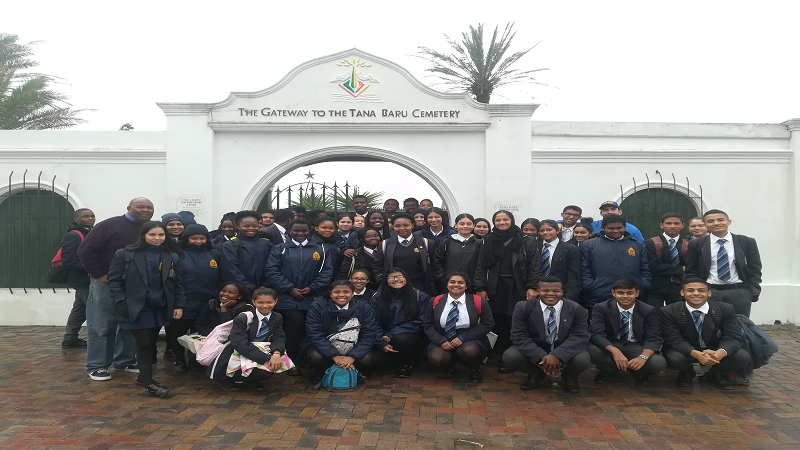By Anees Teladia
Groote Schuur High School’s grade 10 students went out on an exciting excursion today, learning valuable lessons about modern politics, gentrification, social justice and heritage. The students were taken on this excursion as part of a project driven by two educators at the school, Keiran Peacock and Stephen Ulyate. The organised visit holds significance as it reflects the educators’ (and the school’s) interest in holistic educational development – qualities desperately needed in South Africa.
The students visited the Bo-Kaap Museum where they were joined by two guest speakers, the Auwal Masjid (South Africa’s oldest mosque), the Tana Baru Cemetery – including the “kramats” or tombs – and went on a walkabout through the area with a local guide and educator.
Head of Life Orientation and a History teacher at Groote Schuur High School, Keiran Peacock says that it’s important for students to learn about, and to understand, our local heritage. Peacock feels that the best way to do that is to provide students with direct exposure and experiences.
“As Capetonians, we have a very diverse and rich history, [however] I think that many communities within Cape Town are very insular in that people are not aware of, or simply do not know about, the rich heritage and difference of heritage that exists within this region.”
“It’s important for learners at a school like ours – that kids who come from across the region are exposed to different histories. We have a number of Muslim learners at our school and it’s important that they understand their own heritage in relation to their faith and their ancestral history within Cape Town. The only way to do that, is through firsthand experience,” said Peacock.
Peacock added that Bo-Kaap was the perfect place to teach their students about the conflict that can exist between modern day politics and issues relating to development, gentrification and heritage.
“The idea was that they [the students] have to do a project on heritage and the conflict that exists between modern day politics and gentrification, and being able to sustain and hold on to a region’s heritage.”
“I think that the Bo-Kaap is a perfect place [for learning these lessons] because it is where the conflict meets,” said Peacock.
“It’s very difficult to get an understanding like that from a textbook.”
A Geography and History teacher at the school, Stephen Ulyate indicated that through excursions to places such as Bo-Kaap, educators like himself and Peacock are trying to promote the idea of diversity through heritage. Ulyate added that the students are exploring ways in which to protect heritage from excessive commercialisation and gentrification.
“By coming to a place like Bo-Kaap, we’re starting to see the importance of having heritage,” said Ulyate.
“We’re trying to promote the idea of diversity through heritage and that’s why we came…We’re [also] looking at how to protect our heritage from commercialisation and gentrification.”
Ulyate highlighted that what can be seen occurring in Bo-Kaap today is reminiscent of what transpired during the forced removals perpetrated by the Apartheid regime.
He says that people are being forced to move to the periphery through economic pressure and exclusion, consequently exacerbating the socioeconomic conditions of already previously disadvantaged groups.
“You can look at District Six and anywhere throughout South Africa…[we had] the forced removals through the Group Areas Act and now [we have] this economic forced removal where rates and levies are becoming higher and higher.”
“People can’t afford to live in these areas anymore, so they have to give up this inner city living – where you’re close to jobs and close to the bright lights…you [then] have to substitute that and move out toward the periphery, where the lifestyle is different and where your access to jobs and education seems to deteriorate the further you move out…”
“People get pushed out to the periphery because that’s all they can afford,” said Ulyate.
Peacock and Ulyate both wish to see a more holistic form of education being promoted in South African Schools and feel that learning should be done through experiences gained outside of the classroom, more often.
They also indicated that they would like to see more schools promoting our own local cultures and our diverse Capetonian heritage, educating the youth and removing insular patterns and attitudes.
“For me, the encouragement would be for schools who don’t think that this is part of their heritage – because they don’t have a strong Muslim population – to expose their learners to this type of heritage. Often, what you find is that schools that come to do this are largely Muslim schools, and so I think that you remain insular.
Schools of predominantly white, middle-class origin are doing heritage projects that are quite Eurocentric in focus or are based in a book and are not necessarily authentic Capetonian heritage based. So, I’d encourage a broader audience to be exposed to this kind of heritage,” said Peacock.
“Education shouldn’t just be done in a classroom…I think it’s very important that we start promoting our own culture and actually take education outside of the classroom,” said Ulyate.
PHOTOS:


LISTEN BELOW:
VOC






 WhatsApp us
WhatsApp us 

